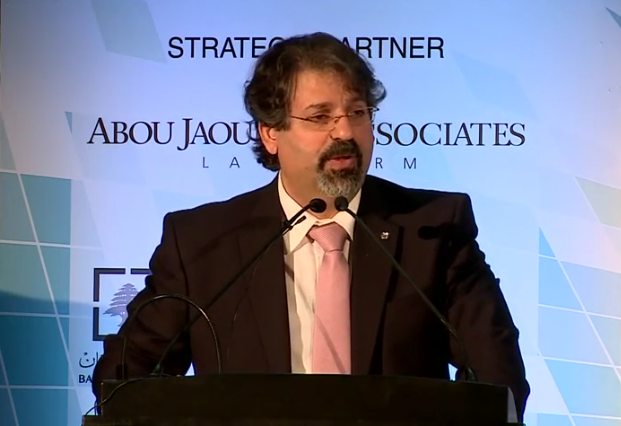jassemajaka@gmail.com
Euromoney Conference 2015 – Speech of Prof. Jassem AJAKA
Euro-money Conference – Finance and Technology: Partners for Growth
June 9,2015 – Four Seasons Hotel – Beirut
Professor Jassem Ajaka, Economic Affairs Adviser
Ministry of Economy and Trade Lebanon
Excellencies, Honorable Guests, Ladies and Gentlemen, It gives me great pleasure to be here today at the inaugural Euromoney Lebanon Conference that is supported by the Banque du Liban and the CMA and is entitled: “Finance and Technology: Partners for Growth”.
Ladies and Gentlemen,
Since 2011, the Lebanese economy has been observing a reversal in the trends that has witnessed up until 2010 whereby the economy back then was relatively stable and witnessed a strong performance in many sectors, particularly in the construction, tourism and banking sectors.This reversal has mainly been the result of the political stalemates at the domestic level and the fact that the Lebanese economy and society withstood the hosting of an unprecedented number of displaced Syrians, whose number exceeded 1.5 Million people, accounting for more than 40% of the Lebanese population.This unexpected situation has resulted in a weakening in the social, economic and security situation, which in turn, has led to a:
-
Discouragement in tourism and private investment as well as a weakening in trade
-
Rise in the rates of unemployment that are expected to exceed 25% of the total population and in the levels of poverty
-
Deterioration in external imbalances and public finances, as the rising demand for public services (such as water, energy, health, education, waste management etc.) exerts pressure on government spending.
Ladies and Gentlemen,
Our economy has become a transfer economy and we need to take the right steps to change its structure. This will require placing a strategic plan with “knowledge economy” as its core and use technology as a vehicle, for it is inevitable that without research, growth cannot be induced in the world economies.
At the macro level, the policy and regulatory frameworks are essential to the performance of a sector. In fact, decisions of global buyers to source or invest in certain sectors depend on the political and macro-economic stability. This encompasses a large number of areas: monetary, fiscal and exchange rate policies, education, skills and labor market policies, investments in health, safety, and especially the rights of property.
The prevalent political instability in the country has led to a lack of investor confidence and as such, to a lack of investments in the country as a whole.Looking further into Lebanon’s case, we are convinced that the important role that financial services play combined with technology, will allow the creation of a value chain which is defined as the full range of activities and combinations of production factors that businesses go through to bring a product or service from conception to delivery. The significance of the value chain is that it separates useful activities which allow the sector as a whole to gain competitive advantage, from the wasteful activities.
Focusing on the value-creating activities could give the sector many advantages. Hence, these combinations that we should focus on will allow Lebanon to transform regionally into a hub of financial services as we all know that Lebanon is known for its excellent banking and financial operations that help to rationalize and regulate the production processes.
Moreover, with the new era of gas in Lebanon, we see the need to create and develop financial instruments on the Beirut stock exchange related to buying and selling futures and forward with gas as underlying. This in turn requires a new engineering in the financial domain and no better tool and vehicle for this than technology!Honorable Guests,Technology is the core to the success of every business and especially to the success of SMEs nowadays. The IT sector in Lebanon specifically is a fast growing sector with a market size expected to reach 570 million US Dollars in 2017.
The sector is mostly dominated by small and medium size businesses which are mostly engaged in the development of software products and mobile applications.Today, there are more than 300 companies involved in ICT related activities which proves that Lebanon is emerging as a leading exporter of software products and services.
This gives us the incentive to further enhance the entrepreneurial ecosystem and the levels of quality and innovation present in the Lebanese IT products to trigger considerable investments in the development of the ICT infrastructure in Lebanon.Moreover, these investments will also allow for more employment in the sector knowing that the ICT sector currently employs more than 7,000 highly skilled and multilingual individuals; and to further support the development of the country’s knowledge economy.
Nevertheless, all of this cannot be done without providing the appropriate financial support to this new wave of innovative SMEs and start-ups. This support will be able to create more and more investments that in turn will generate wealth and result in growth, with technology playing a big and a very important role in leveraging this growth.
This is a further reason why finance and technology go hand in hand for a better business and hence a better business environment.
Ladies and Gentlemen,
The Lebanese banking sector has proven to be one of the strongest and the most resilient sectors in Lebanon. And we owe all this to the vision of the Governor H.E. Riad Salameh who has been able to render the banking sector one of the most profitable, highly liquid and well-capitalized in the region.
Taking everything into consideration, with the current situation, this is not enough. Banks should be able to further finance the economy especially through financing sectors that are technology-based because: Yes, Finance and Technology are the drivers for growth and enhancing the relation between them would allow for a more solid and active economy.
Lebanon’s opportunities are many given its strategic geographical location and its open business culture which allow it to have an easy access to the expanding regional markets and moreover allows investments in Lebanon to cater to a growing regional market of more than hundred million consumers.
Once again, I would like to express my pleasure to be here at this conference and I am looking forward to the recommendations and results.
Thank you.


